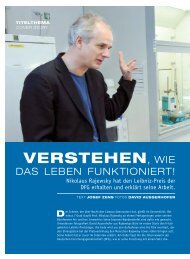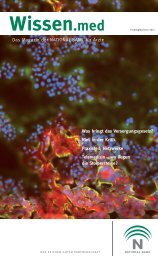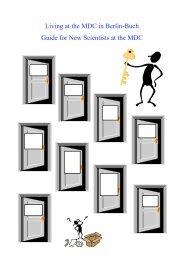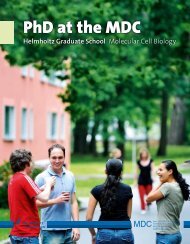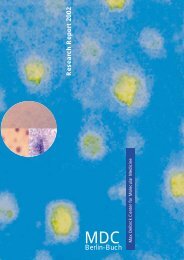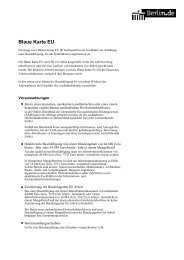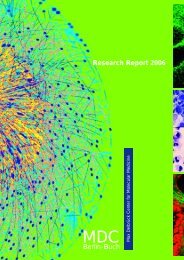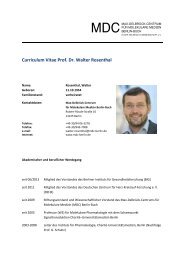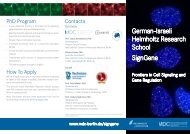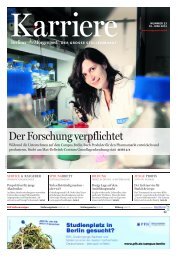Structure of the GroupGroup LeaderPD Dr. Uta E. HöpkenKristina SchradiSusann WinterUta E. Höpken(Delbrück Fellow)Graduate StudentsAngela MensenKatharina WichnerTechnical AssistantsKatrin RäbelHeike SchwedeRegulatory Mechanisms of LymphocyteTrafficking in Homeostasis andImmunopathogenesisRegulated lymphocytic recirculation is pivotal in immune system homeostasis andimmunopathogenesis. Our work is focused on the role of the chemokine/chemokinereceptor system in homeostatic lymphocytic recirculation, systemic and mucosal immuneresponses, and lymphoid neo-organogenesis during chronic inflammatory or infectiousdiseases. We further focus on the molecular mechanisms of immune surveillance inpreclinical mouse models for B cell lymphoma.Lymphocytic homeostasis and mucosal immunityChemokine receptors regulate peripheral homeostaticlymphocyte recirculation and mucosal immunityRecently, we showed that the chemokine receptor CCR7controls not only lymphocyte trafficking to and withinsecondary lymphoid organs, but also homeostaticmigration of T and B lymphocytes through non-lymphoidperipheral tissues. CCR7 deficiency results in massiveaccumulation of T- and B-lymphocytes in the peritonealcavity. Mechanistically, an increase in peritoneallymphocyte numbers is caused by impaired egress ofCCR7-deficient lymphocytes from body cavities. Mostinterestingly, disturbed peripheral recirculation of lymphocytesalso resulted in the development of ectopiclymphoid-like follicles and age-dependent histopathologicalchanges in the gastrointestinal tract of CCR7-deficient mice. Since the formation of ectopic folliclesprecedes the development of epithelial histomorphologicalchanges, we suggest that crosstalk betweenlymphoid aggregates and their adjacent epithelial tissuemight contribute to the development of hypertrophicgastropathy.The underlying molecular mechanisms have beenaddressed by performing expression profiling of differentiallyexpressed genes between wild-type epithelialtissue and CCR7 -/- epithelial tissue or mucosal lymphoidaggregates. Several transcription factors and signalingmolecules were selected on basis of the microarraydata and are further characterized as potential mediatorsinvolved in this celluar crosstalk.Chemokine/chemokine receptor function ininfectious gastrointestinal cancer modelsThere is considerable evidence for the involvement ofhomeostatic chemokines in the formation of tertiarylymphoid tissues during chronic inflammatory processessuch as rheumatoid arthritis and Helicobacter pyloriinducedgastritis. A potential relationship betweenchronic inflammation, establishment of extranodal tertiaryfollicles and lymphoma pathogenesis has beeninferred from gastric MALT lymphomas in humans. Wehave analysed the role of the homeostatic chemokinereceptor CXCR5 in the formation of mucosal tertiarylymphoid tissue after H. pylori infection. CXCR5-deficientmice failed to develop lymphoid aggregates in theglandular stomach and exhibited lower H. pylori-specificserum IgG responses compared to infected wild-typemice. Thus, the development of mucosal tertiary ectopicfollicles during chronic H. pylori infection is stronglydependent on the CXCL13/CXCR5 signaling axis.To date, we study the function of additional chemo -kine/chemokine receptors during the pathogenesis of120 Cancer <strong>Research</strong>
CXCR5 drives the development of ectopic follicles in the gastric mucosa inH. pylori-infected mice. Histological analysis of paraffin embedded stomachsof CXCR5 -/- compared to wild type mice 5-6 month after H. pyloriinfection showed that ectopic follicles do not develop in CXCR5 -/- mice.MALT-lymphoma and gastric cancer in in vivo mousemodels.Immunosurveillance and interactions betweentumor cells and its microenvironmentIdentification of a chemokine receptor profile characteristicfor mediastinal large B-cell lymphoma (MLBCL)in cooperation with A. Rehm, I. Anagnostopoulos, H. Stein,and B. Dörken, <strong>MDC</strong>, Charité, BerlinWe have shown that the most frequent lymphomaentities involving the mediastinum can be diagnosedbased on the combination of five different homeostaticchemokine receptor stainings. In contrast to diffuselarge B cell lymphoma (DLBCLnos) and classicalHodgkin lymphoma, MLBCLs are largely devoid of thehomeostatic chemokine receptors CXCR5 and CCR7, andalso lack CCR6. These findings suggest that extranodallocalization and lack of nodal dissemination in MLBCLare related to the expression of those lymph nodeaddressins. Conversely, expression of these receptors onessentially all B cell neoplasms with a widespread nodaldissemination provide a rationale for the therapeutictargeting of homeostatic chemokine receptors withantibodies or antagonistic compounds.Cellular interactions between lymphoma cells andtheir accessory or tumor stroma cellsin cooperation with A. Rehm, and B. Dörken, <strong>MDC</strong>, Charité,BerlinBased on our phenotypical analysis of chemokine/chemokine receptor expression in MLBCL, we now focuson the cellular interactions between lymphoma cellsand their accessory or tumor stroma cells. Investi gat -ions on the relationship between lymphoma cells andits local immune environment includes the analysis ofactive immune escape mechanisms in murine B celllymphoma. We backcrossed the transgenic malignantlymphoma mouse strain, Eµ-Myc, onto diversechemokine receptor KO strains, which will help to decipherthe influence of tumor cell homing within a specificlymph node and splenic niche onto disease onsetand progression. A more profound understanding ofmechanisms that may cause non-Hodgkin lymphomato be addicted to the local microenvironment could providenew targets for therapeutic intervention.Immunoregulatory functions of the tumorassociatedantigen EBAG9/RCAS1in cooperation with A. Rehm, and B. Dörken, <strong>MDC</strong>, Charité,BerlinThis project studies whether the estrogen-inducibletumor-associated antigen, EBAG9, has a concurrentimpact on T cell-mediated tumor immunosurveillance.Cytotoxic T lymphocytes (CTL) are essential forimmuno surveillance and score cells for the display oftumor-derived peptides. For target cell destruction, CTLsemploy polarized secretion of lytic granules. We generatedEBAG9 knockout mice and characterized the consequencesof its deletion in CTL-mediated immuneresponses. Loss of EBAG9 amplifies the release of lyticgranules and confers CTLs with an enhanced cytolyticactivity, in all likelihood through improved formation offusion- and release-competent secretory lysososomes.With regard to tumor immunosurveillance and tumorimmunotherapy, modulating the cell biological roadblocksin T cell activation and cytolytic capacity on a singlecell level emerges as a strategy to increase avidityand to strengthen anti tumor T cell efficiency. Our identificationof the estrogen tunable repressor of cytotoxicT cell activity, EBAG9, will allow us to suppress its activitythrough pharmacological estrogen receptor blockade.Selected PublicationsHöpken, UE, Winter, S, Achtman, AH, Krüger, K, Lipp, M. (<strong>2010</strong>). CCR7regulates lymphocyte egress and recirculation through body cavities.J. Leukoc. Biol. In press.van de Pavert SA, Goverse G, Vondenhoff MF, Beke P, Höpken UE, Lipp M,Niederreither K, Blomhoff R, Agace WW, Mebius R (2009): CXCL13 is essentialfor lymph node initiation and is induced by retinoic acid and neuronalstimulation. Nature Immunology 10, 1193-1199.Rüder, C, Höpken, UE*, Wolf, J, Mittrücker, H-W, Engels, B, Erdmann, B,Wollenzin, S, Uckert, W, Dörken, B, Rehm, A*. (2009). The tumor-associatedantigen EBAG9 negatively regulates the cytolytic capacity of mouseCD8+ T cell. J. Clin. Invest. 119: 2184-2203*shared corresponding authorRehm, A, Anagnostopoulos, I, Gerlach, K, Broemer, M, Scheidereit, C,Jöhrens, K, Hübler, M, Stein, H, Lipp, M, Dörken, B, Höpken, UE. (2009).Identification of a chemokine receptor profile characteristic for mediastinallarge B-cell lymphoma. Int. J. Cancer 125, 2367-2374Höpken, UE, Wengner, AM, Loddenkemper, C, Stein, H, Heimesaat, MM,Rehm, A, Lipp, M. (2007). CCR7 Deficiency causes ectopic lymphoidneogenesis and disturbed mucosal tissue integrity. Blood 109, 886-95.Cancer <strong>Research</strong> 121
- Page 1:
Research Report 2010MAX DELBRÜCK C
- Page 4 and 5:
ContentInhaltContentInhalt.........
- Page 6 and 7:
Surgical OncologyPeter M. Schlag...
- Page 11 and 12:
at the MDC. The role of the institu
- Page 13 and 14:
in discovering genes that contribut
- Page 16 and 17:
The ECRC offers research space and
- Page 18 and 19:
etween disciplines such as biology,
- Page 20 and 21:
approaches from bioinformatics/syst
- Page 23 and 24:
von Humboldt Foundation (AvH). The
- Page 25:
organization to a larger, multi-fac
- Page 28 and 29:
Cardiovascular and Metabolic Diseas
- Page 30 and 31:
electrical signals. More recent wor
- Page 32 and 33:
Basic Cardiovascular FunctionStruct
- Page 34 and 35:
Figure 2: SORLA and sortilin in neu
- Page 36 and 37:
Annette Hammes(Delbrück Fellow)Str
- Page 38 and 39:
Ingo L. MoranoStructure of the Grou
- Page 40 and 41:
Figure 3. Membrane resealing assay
- Page 42 and 43:
Michael GotthardtStructure of the G
- Page 44 and 45:
Structure of the GroupSalim Seyfrie
- Page 46 and 47:
Structure of the GroupFerdinand le
- Page 48 and 49:
Francesca M. SpagnoliStructure of t
- Page 50 and 51:
Structure of the GroupKai M. Schmid
- Page 52 and 53:
Genetics and Pathophysiology of Car
- Page 54 and 55:
Figure 2. Planariato experimentally
- Page 56 and 57:
Norbert HübnerStructure of the Gro
- Page 58 and 59:
Structure of the GroupGroup LeaderF
- Page 60 and 61:
Figure 2. Omega-3 fatty acids prote
- Page 62 and 63:
Structure of the GroupDominik N. M
- Page 64 and 65:
Rainer DietzStructure of the GroupG
- Page 66 and 67:
Figure 2. Cardiac-restricted ablati
- Page 68 and 69:
Ludwig ThierfelderStructure of the
- Page 70 and 71:
standing of the molecular and cellu
- Page 72 and 73:
Structure of the GroupThoralf Niend
- Page 74 and 75:
Michael BaderStructure of the Group
- Page 76 and 77:
Natriuretic peptide systemJens Butt
- Page 78 and 79:
Structure of the GroupZsuzsanna Izs
- Page 80 and 81:
Young-Ae LeeStructure of the GroupG
- Page 82 and 83:
Structure of the GroupMatthias Selb
- Page 84 and 85:
Matthew PoyStructure of the GroupGr
- Page 86 and 87:
Jana WolfStructure of the GroupGrou
- Page 88 and 89:
Structure of the GroupGroup LeaderD
- Page 91 and 92:
Cancer Research ProgramKrebsforschu
- Page 93 and 94:
are responsible for the emergence o
- Page 95 and 96: tral component of the canonical Wnt
- Page 97 and 98: lead to an aberrant constitutive ac
- Page 99 and 100: How Notch- and TGFβ signaling casc
- Page 101 and 102: tures of the chronic phase in human
- Page 103 and 104: oped a new safeguard that is based
- Page 105 and 106: Graduate StudentsSeda Cöl ArslanCa
- Page 107 and 108: investigation, as is the cause of c
- Page 109 and 110: Graduate StudentsÖzlem Akilli Özt
- Page 111 and 112: onment, the (cancer) stem cell nich
- Page 113 and 114: The pluripotent state of murine and
- Page 115 and 116: In the morula of the early mouse em
- Page 117 and 118: Graduate StudentsRami Hamscho*Qingb
- Page 119 and 120: esis and granulopoiesis. We showed
- Page 121 and 122: URE ∆/∆ mice regularly develope
- Page 123 and 124: PD Dr. Wolfgang Walther (GroupLeade
- Page 125 and 126: For the delivery of naked DNA into
- Page 127 and 128: ACBDMyc and FoxO transcription fact
- Page 129 and 130: Graduate StudentsKatrin BagolaHolge
- Page 131 and 132: Heinemann, we could also identify t
- Page 133 and 134: Above: Tip of chromosom3L showing t
- Page 135 and 136: Graduate StudentsSarbani Bhattachar
- Page 137 and 138: vesicle transport to the Golgi. Our
- Page 139 and 140: acbFigure 1a: EHD2 is tubulatingpho
- Page 141 and 142: KnowledgeProbabilitiesknownPossible
- Page 143 and 144: Graduate and undergraduatestudentsU
- Page 145: successive oncogenic mutations. We
- Page 149 and 150: Graduate and undergraduatestudentsW
- Page 151 and 152: Graduate andUndergraduate StudentsM
- Page 153 and 154: Angela MensenStefanie WittstockBjö
- Page 155 and 156: deficient mice, both major effector
- Page 157 and 158: ant of CD3 delta coding for a 45-me
- Page 159 and 160: Robert KudernatschLi-Min LiuAna Mil
- Page 161 and 162: Sebastian GüntherTechnical Assista
- Page 163 and 164: Graduate StudentsJana RolffAnnika W
- Page 165: with murine hepatocytes showed morp
- Page 168 and 169: Function and Dysfunction of the Ner
- Page 170 and 171: The Neuroscience Department also es
- Page 172 and 173: the coming years, Björn Schröder
- Page 174 and 175: mice. Further analysis of the funct
- Page 176 and 177: Signaling Pathways and Mechanisms i
- Page 178 and 179: Control Olig3 -/-ABFigure 2. Geneti
- Page 180 and 181: Thomas J. JentschStructure of the G
- Page 182 and 183: Figure 2. Cellular model for ionic
- Page 184 and 185: Structure of the GroupGroup LeaderF
- Page 186 and 187: paired-pulse facilitation, less dep
- Page 188 and 189: Gary R. LewinStructure of the Group
- Page 190 and 191: Model summarizing the three waves o
- Page 192 and 193: Structure of the GroupInes Ibañez-
- Page 194 and 195: Jochen C. MeierStructure of the Gro
- Page 196 and 197:
Björn Christian SchroederStructure
- Page 198 and 199:
Structure of the GroupJan Siemens(S
- Page 200 and 201:
Structure of the GroupGroup LeaderD
- Page 202 and 203:
Imaging of the Living BrainStructur
- Page 204 and 205:
Pathophysiological Mechanisms of Ne
- Page 206 and 207:
Figure 2. Iba1 positive microglia c
- Page 208 and 209:
Erich E. WankerStructure of the Gro
- Page 210 and 211:
Scientific-Technical StaffAnja Frit
- Page 212 and 213:
Structure of the GroupJan Bieschke(
- Page 215 and 216:
Berlin Institute of Medical Systems
- Page 217 and 218:
etes, metabolic diseases and neurod
- Page 219 and 220:
A number of MDC investigators have
- Page 221 and 222:
Technical AssistantsClaudia Langnic
- Page 223 and 224:
has become a standardized data flow
- Page 225:
Phylogeny of cellulase genes from P
- Page 228 and 229:
Experimental and Clinical Research
- Page 230 and 231:
his patients, and a basic research
- Page 232 and 233:
The ultrahigh field MR facility was
- Page 234 and 235:
Structure of the GroupSimone Spuler
- Page 236 and 237:
Ralph KettritzStructure of the Grou
- Page 238 and 239:
Structure of the GroupJeanette Schu
- Page 240 and 241:
Maik GollaschStructure of the Group
- Page 243 and 244:
Technology PlatformsComputational B
- Page 245 and 246:
projects/ard/] to detect repeats li
- Page 247 and 248:
Simulation of line-scan images of C
- Page 249 and 250:
Development of an MRM method for qu
- Page 251 and 252:
mobility or turnover of the underly
- Page 253 and 254:
Left: Inside view of a FACSAria2 (f
- Page 255 and 256:
Examples fort the use of EM methods
- Page 257:
Oviducts lined up in pre-implantati
- Page 260 and 261:
Academic Appointments 2008-2009Beru
- Page 262 and 263:
Buch which is part of the Excellenc
- Page 264 and 265:
“Bioinformatics in Quantitative B
- Page 266 and 267:
Delbrück FellowsDelbrück-Stipendi
- Page 268 and 269:
Yinth Andrea Bernal-Sierra, a PhD s
- Page 270 and 271:
Congresses and Scientific MeetingsK
- Page 272 and 273:
SeminarsSeminare2008Speaker Institu
- Page 274 and 275:
Speaker Institute TitleKiyoshi Mori
- Page 276 and 277:
2009Speaker Institute TitleDavid G.
- Page 278 and 279:
Speaker Institute TitleJuri Rappsil
- Page 280 and 281:
The Helmholtz AssociationDie Helmho
- Page 282 and 283:
The Berlin-Buch CampusDer Campus Be
- Page 284:
the MDC, the existing collaboration
- Page 287 and 288:
Prof. Dr. Gary R. LewinMDC Berlin-B
- Page 289 and 290:
Prof. Dr. Renato ParoCenter of Bios
- Page 291 and 292:
Staff CouncilThe Staff Council is i
- Page 293 and 294:
Type of Financing/Art der Finanzier
- Page 295 and 296:
Research Projects 2008-2009Forschun
- Page 297 and 298:
CIC-5 Regulation und Endocytose am
- Page 299 and 300:
MDCMAX-DELBRÜCK-CENTRUMFÜR MOLEKU
- Page 301 and 302:
Index 275Bröske, A. . . . . . . .
- Page 303 and 304:
Index 277Gross, V. . . . . . . . .
- Page 305 and 306:
Index 279Kur, E. . . . . . . . . .
- Page 307 and 308:
Index 281Piano, F. . . . . . . . .
- Page 309 and 310:
Index 283Smink, J. . . . . . . . .
- Page 312 and 313:
Campus MapCampusplanRobert-Rössle-
- Page 314:
How to find your way to the MDCDer



